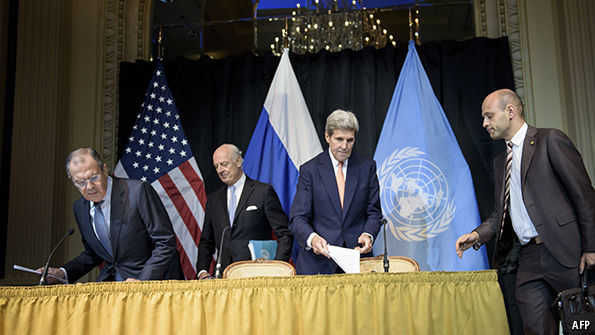What does Russia hope to accomplish in its diplomatic maneuvering on Syria?
The previous post in our Putin in Syria column can be found here.
Last week, a group of representatives from various nations met in Vienna to discuss a possible path forward in Syria. The talks included representatives from the United States, Russia, Saudi Arabia, Turkey, Egypt, Qatar, Lebanon, France, Britain, Germany — and, for the first time, Iran, a nation which is supporting the Assad regime with money, material, combat troops, intelligence, and command & control assistance.
Though the international peace process has accomplished almost nothing since 2011 when the crisis began, The Wall Street Journal wrote before the conference that at least this time the world was actually paying more attention to Syria:
For the past four years, the main international actors on the Syrian conflict have resembled a group of the unwilling, the risk averse, the self-interested and the unhelpful with little motivation to step in to try to stop the fighting. The war has left 250,000 dead, hundreds of thousands wounded and traumatized, and produced the largest single refugee crisis since the end of World War II. Three major factors have refocused matters: the refugee crisis in Europe; Russia’s military intervention in Syria, and the Iranian nuclear deal. These events have created more urgency and perhaps more leverage to de-escalate the war and maybe even put Syria on a track toward stability.
The Economist sums up the only tangible result — “no one walked out.”
At first glance the nine-point statement put out at the end looks good, too. It pledges to work for a ceasefire and commits the parties to an UN-led transition in which Syrians, including the diaspora, elect their leaders. The powers will meet again within two weeks’ time to discuss it further.
Yet no party hid the fact that there was no agreement on the fate of Mr Assad, one of the main points of contention. Speaking at a security conference in Bahrain organised by IISS, a British think-tank, Adel al-Jubair, the Saudi foreign minister, restated the Saudi belief that peace could not be achieved as long as Mr Assad stayed in power: “He should leave this afternoon. The sooner the better.” He also insisted that Iranian forces would have to be withdrawn as part of any agreement.” If progress is not made, he said Saudi Arabia will step up support for “moderate” rebels, including the delivery of more lethal weapons—though he did not spell out what those might be.
Of late America had appeared to modify its position on Mr Assad by saying he could stay for six months rather than requiring that he step down before any transition begins. It sounded like a compromise had been made when reports circulated that Iran had agreed to a limitation of six months for Mr Assad.
Yet Iran quickly contradicted the news, denying that it had agreed to any time-frame, stressing that only the Syrian people could decide—the line Iran and Russia have long stuck to. Iran and Russia would like to see early polls, despite Mr Assad’s having been “elected” to a seven-year term in 2014. They are convinced that he would win, without any of the rigging or gerrymandering that tends to accompany Syrian ballots.

Iran joins talks in Vienna about the Syrian civil war
IT COULD have been worse. That was more or less the read-out after talks on Syria in Vienna on October 30th between allies and foes of President Bashar al-Assad including America, Saudi Arabia, Russia and, for the first time, Iran.
Russian government statements, however, do provide clues as to the “solution” Russia may be pursuing. Yesterday Andrei Kartapolov, Chief of the Main Operational Directorate of the General Staff of the Russian Armed Forces, said that Russia was using intelligence given to them willingly by opposition groups to target “terrorists” in Syria. As we analyzed yesterday, Kartapolov is likely referencing a group of regime insiders whom the internationally-recognized opposition rejects as being legitimate voices of the Syrian people. One goal, then, may be to supplant the real opposition with something more acceptable to Iran, Russia, and Assad
This tactic alone, however, will not likely net results. To succeed, Russia would also need to weaken international support for the widely-recognized opposition while simultaneously attempting to destroy the strongest rebel units and perhaps ultimately creating disunity within opposition groups.
Russian Foreign Minister Sergei Lavrov appears to be very happy with the format of the talks which include Iran. At the conclusion of talks with Stefan de Mistura, UN Secretary General special envoy on Syria, Lavrov called the format ‘almost perfect.’ The Kremlin-operated propaganda outlet Sputnik reports:
“Vienna format was almost a perfect format for multilateral efforts for Syrian settlement and we want to anchor that,” Lavrov said in Moscow.
Lavrov also said outsiders must influence the Syrian opposition (translation by The Interpreter):
“It is necessary for external players who influence various groups in the opposition to a decisive degree, to use their influence, to apply it so that these detachments convene at these political negotiations with a constructive platform so that they don’t try to ‘pull the blanket to themselves,’ and form a united delegation.”
Russia will likely push a “compromise,” wherein they try to convince nations to drop the precondition that Assad must leave as part of a transitional period while attempting to get the Assad-acceptable opposition parties a seat at the table. If that were to happen, there is a real possibility that the deal would be rejected by the main opposition groups and most or all of the rebels fighting in Syria.
In other words, Russia’s goal may be to get everyone to agree to a deal which is doomed to fail. This would not be the first time they pursued such a strategy in Syria, and there are certainly also parallels between the Russian strategy in Syria and its efforts to sow chaos in Ukraine.
— James Miller, Catherine A. Fitzpatrick